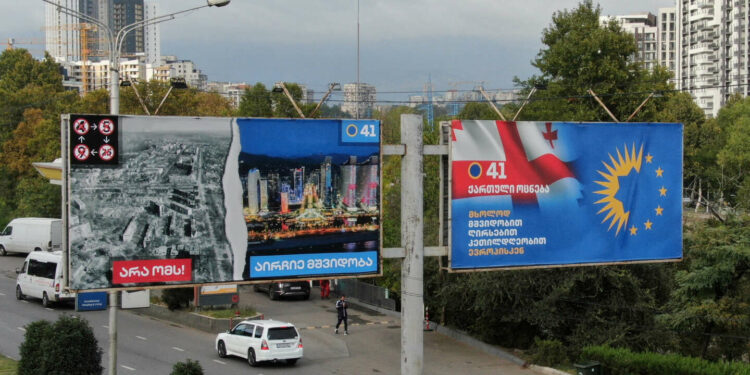Amid the great geopolitical upheaval provoked by Russia’s invasion of Ukraine on February 24, 2022, a small pawn has slipped through the cracks – a pawn that Europeans would prefer not to see, but which they may well be rudely reminded of in three weeks’ time: Georgia. On October 26, the 3.7 million inhabitants of this country in the Caucasus will vote in parliamentary elections, which will be decisive for the path they have taken since they broke away from the Soviet Union in 1991.
The opposition has presented the election as a crucial choice between Russia and Europe. It believes it has a good chance of winning, and hopes to put an end to the 12-year reign of the Georgian Dream party. This period has been marked by a clear regression of democracy, with, since 2022, legislation inspired by the Russian model. Yet what the opposition doesn’t know, according to the leaders of its four main parties who spoke in interviews conducted in Tbilisi by the Georgian and Spanish think tanks Gnomon Wise and CIDOB, is whether Georgian Dream will agree to step down if it is defeated.
What does this have to do with Europeans? Eighty percent of the Georgian population – a steady figure throughout polls – wants to join Europe. This attachment is so strong that both the government and the opposition are campaigning under the flag of the European Union. Yet what kind of Europe are we talking about? Georgian Dream’s Europe bears a striking resemblance to that of Hungarian leader Viktor Orban, with whom the party has close ties: A Europe that would not be dominated by the “global war party,” that would stop helping Ukraine to defend itself and deprive LGBTQ+ minorities of their rights. If re-elected, Georgian Dream promises to ban opposition parties.
Read more Subscribers only Europe’s radical rights celebrate at League party rally in Italy
The opposition, for its part, wants to get back on the path to integration with the European Union and its values, which the bloc’s 27 member states had made overtures about by granting Georgia candidate status in 2023, a reassuring half-measure in the wake of the Russian war of aggression in Ukraine. It was precisely this accession process that Brussels froze this summer, in reaction to the Georgian parliament’s adoption of a repressive law on “foreign influence,” which is incompatible with European law. Once again, the EU is faced with a dilemma: Should it rise to the geopolitical challenge and anchor Georgia to Europe to protect it from Russian influence, or should it refuse to compromise on democratic reforms, even if it means risking letting Georgia drift into Moscow’s orbit?
You have 58.12% of this article left to read. The rest is for subscribers only.
Source link : https://www.lemonde.fr/en/opinion/article/2024/10/09/georgia-s-elections-are-a-new-geopolitical-test-for-the-eu_6728759_23.html
Author :
Publish date : 2024-10-09 11:08:32
Copyright for syndicated content belongs to the linked Source.



